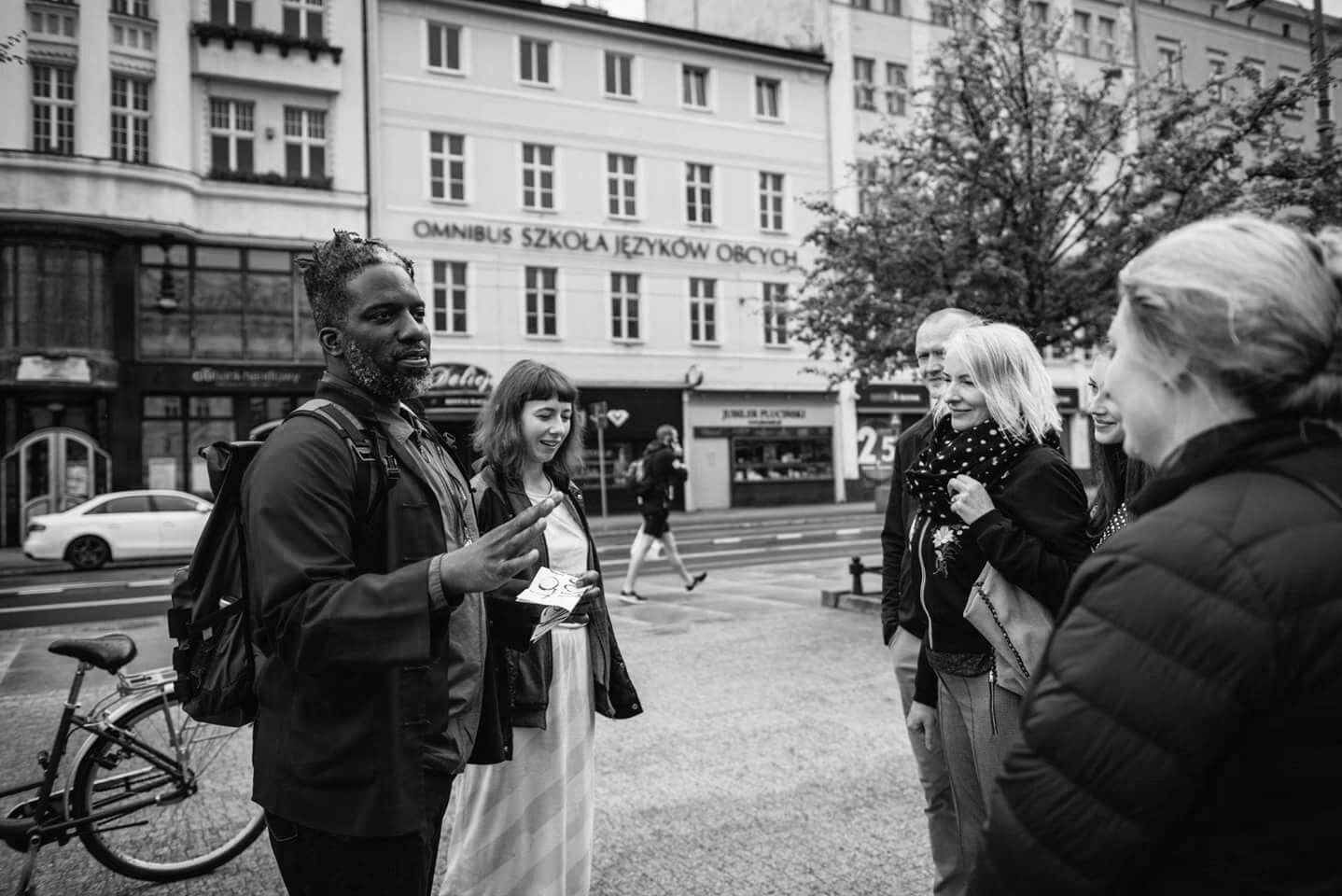7pm> Tunde Adefioye | Archiving the Waywards: a Black Dramaturgical Perspective

ARCHIVING THE WAYWARDS AND THEIR ARCHIVES: A BLACK DRAMATURGICAL PERSPECTIVE
Tunde Adefioye
in dialogue with Kasia Torz
16 June – 7 pm CET
English language
The Wayward, a departure from Saidiya Hartman’s definition in her seminal book Wayward Lives/Beautiful Experiments, with a slight alteration. The Wayward in Europe are Black and Brown folks who are not necessarily included in the fabric of Western European histories. At least in the US, these same bodies and the archives they hold have broken into the societal and historical purview of US systems, though of course not without a lot of struggle.
Struggles and efforts also have a history in Europe, whether it is the research of Caryl Phillips, Grada Kilomba or the more current work of the Belgian organization Black Speaks Back. This is not a comparative study because of differential histories between the US and Western Europe. Instead, the focus should be more on the work that still needs to be done and where resources need to come from. Furthermore, the work of archiving the wayward and their archives has to be done from a Black dramaturgical foundation that looks at who occupies European cities and how some are allowed or disallowed, written in or written out of these realities.
L’intervento parte dalla definizione di “ribelle” formulata da Saidiya Hartman nel suo libro seminale Wayward Lives/Beautiful Experiments, proponendone una leggera deviazione. I ribelli in Europa sono persone nere e marroni non incluse nel tessuto delle storie dell’Europa occidentale. Negli Stati Uniti, questi corpi, e gli archivi che detengono, sono entrati nella sfera sociale e nella storia dei sistemi statunitensi, sebbene attraverso lunghe lotte.
Lotte e contrasti hanno anche una storia europea, sia che si tratti del lavoro di Caryl Phillips, Grada Kilomba o di quello più recente dell’organizzazione belga Black Speaks Back. Non si tratta di fare uno studio comparativo delle cause alla base delle differenti vicende tra Stati Uniti e Europa occidentale. L’attenzione, invece, è posta sul lavoro che deve ancora essere fatto e da dove le risorse debbano provenire. Inoltre, il lavoro di archiviazione dei ribelli e dei loro archivi deve essere svolto da una fondazione drammaturgica nera capace di osservare chi occupa le città europee, chi è autorizzato o non autorizzato a farlo, chi è inscritto o escluso da queste realtà.
Tunde Adefioye
Tunde Adefioye is a performing arts dramaturg and lecturer. He is a Nigerian-American based in Belgium. He co-founded the youth platform Urban Woorden in Leuven (BE) and was awarded the Prize for Cultural Education by the Flemish Government. In 2016, he began working as “city-dramaturg” as part of Michael De Cock’s team at KVS in Brussels. He has done dramaturgy for projects including Malcolm X and (Not) My Paradise. In the recent years, he has been delivering lectures and speeches, among the other at the 2018 IETM plenary meeting in Portugal, at the Wales Arts International’s conference, at the European Theatre Convention meeting in Dresden. In 2019, he made his directorial debut with Contact Theatre Manchester, with the piece Old Tools > New Masters ≠ New Futures. Additionally, a lecturer of Cultural Criticism and US Popular (Black) Visual Culture at St Lucas Antwerp Art college.
Tunde Adefioye è un dramaturg e lecturer nigero-americano nel campo delle arti dello spettacolo, basato in Belgio. Ha co-fondato la piattaforma per giovani Urban Woorden a Lovanio (BE), e ha ricevuto il Prize for Cultural Education dal Governo fiammingo. Dal 2016 lavora come “drammaturgo per la città” nel team di Michael De Cock al KVS di Bruxelles. Ha realizzato la drammaturgia per vari progetti tra cui Malcolm X e (Not) My Paradise. Negli ultimi anni ha tenuto conferenze e interventi, tra l’altro alla riunione plenaria dell’IETM 2018 in Portogallo, alla conferenza di Wales Arts International, alla riunione della European Theater Convention di Dresda. Nel 2019, debutta alla regia con Old Tools> New Masters ≠ New Futures al Contact Theater di Manchester. Inoltre, è docente di Critica culturale e Cultura visiva popolare (nera) statunitense, presso il St Lucas Antwerp Art college.
Kasia Tórz
Kasia Tórz is a polish curator, writer & editor, researcher, based in Antwerp. Graduate from Philosophy at the University of Warsaw (2005). Between 2008-2019 she has programmed a thematic section of the Malta Festival Poznań (PL) called “Idioms”. In 2019 she starts to be in charge of artistic and programme development of Needcompany. Currently she conducts an artistic research within a.pass (advanced performance and scenography studies) in Brussels. While exploring the notion of dissolving boundaries (smarginatura) both in terms of aesthetics and critical theory, she is seeking for other than language-based ways of writing, i.a. through working with images and different body practices. In that framework, she is interested in the melting points of the poetic, existential and political.
Kasia Tórz è curatrice, scrittrice ed editrice, ricercatrice polacca, basata ad Anversa. Laureata in Filosofia all’Università di Varsavia (2005). Tra il 2008-2019 cura la una sezione tematica del Malta Festival di Poznań (PL) chiamata “Idiomi”. Nel 2019 inizia a occuparsi della promozione artistica e dei programmi di Needcompany. Attualmente conduce una ricerca artistica all’interno di a.pass (advanced performance and scenography studies) a Bruxelles. Interessata a esplorare la nozione di dissolvimento dei confini (smarginatura) sia in termini estetici che di teoria critica, indaga altre modalità di scrittura non basate sul linguaggio, che implichino ad esempio immagini o pratiche corporee. In questo quadro, è alla ricerca dei punti di fusione tra poetico, esistenziale e politico.






